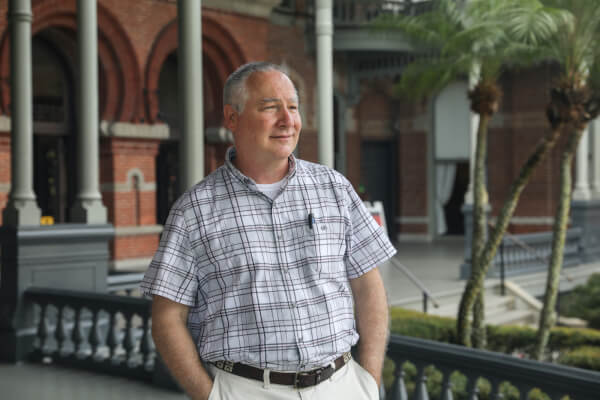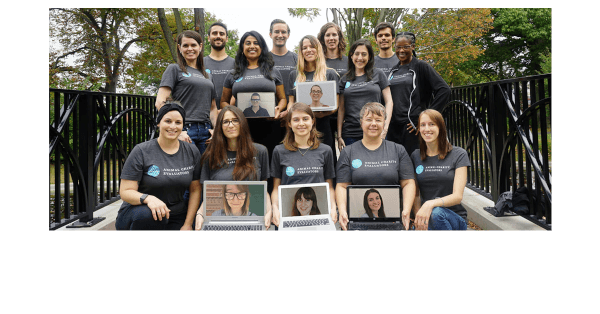For love and money: how talking about finances can unlock successful relationships
Discover how talking about finances can unlock successful relationships. By: Damona Hoffman, dating and relationship coach

Brandon Roots is an award-winning filmmaker who has had films at the Tribeca and Sundance film festivals. Last year he drove across the US and shot America!, a short film which considers the history of migration in a modern context. For our Lives Without Borders series, he explains how the film changed his perception of borders themselves.
I found a land with a long history of immigration and migration.
"We build roads. And when a river must be crossed, we build bridges."
Last year my husband and I set out to visit the National Parks. Matt loves camping, and I love camping because he loves camping. We left New York City in late November, the cargo area of our used Honda CR-V carefully packed for camping in every kind of weather. The South would be warm, the Rockies cold.
We are both freelance filmmakers and wanted to see America. As we made our way through the changing landscapes I shot footage of the country from a pocket-sized drone.
Our route was an unusual one, winding down the East Coast to Florida first then west along the southern border. We took turns driving. Being on the road day after day became meditative.
“I love America,” Matt said to me “like literally the land of the country.” After visiting the sprawling Big Bend National Park in Texas I knew just what he meant. Every park has something about it that is beautiful and unique. Big Bend runs along a stretch of the Rio Grande on the US and Mexico border and encompasses cool mountains and hot dessert. Driving into the park in mid December we traversed a high pass in the midst of a snow storm before driving down into the desert below.
The river moves over time, and so does the country’s border. My mind was blown.
.jpg)
The Rio Grande at night, the longest natural border between the US and Mexico.
Standing at the Rio Grande looking out into Mexican territory reinforced something I had already been feeling: Borders simply don’t exist. The land here, and the land on the other side, looked the same. We had crossed dozens of state lines in the journey that brought us here, and were it not for the welcome signs, or the changing license plate imagery, it would have been hard to tell exactly where we were.
As we made our way into Mexico a parks official pointed out that the river moves over time, and so does the country’s border. My mind was blown.
It was at the end of the first half of our trip that our entire plan changed. On December 22nd the deadlock over funding for a southern border wall led to the longest government shutdown in American history.
We'd just arrived at Joshua Tree in California when we were greeted with the sign: “Area Closed. Because of a lapse in federal appropriations, this Visitor Center is closed for the safety of visitors and park resources.” The message proved grimly ironic. Federal employees were no longer paid, including staff at the national parks. Over the following weeks the park suffered irreparable damage. Trees and trails were destroyed, and vandalism was rife. It may take hundreds of years for the land to recover.

Joshua Tree, which the filmmaker visited during the government shutdown, when neglect and vandalism caused irreparable damage to the park.
It was at this point that I truly felt the mismatch between my experience of the country and the portrayal of crisis in America. I felt so full of love for the landscapes that we share while editing footage from the trip. We all collectively inhabit a beautiful land. But as the debate over the border wall continued—a continent away, in the capital—we saw firsthand the impact of this impasse on our own land. It led to some of the most fragile and precious places falling into disrepair.
I had been looking forward to this journey to break away from the hyperbole and endless news-cycles that seemed determined to tell me how to think about the United States, and instead to experience the country first hand.
From the news coverage about funding a border wall, I might have expected to find a country in anarchy. Instead what I found was a land with a long history of immigration and migration. Regional food, regional dialects, regional architecture, all influenced by the land and the many cultures that have inhabited it before us and continue to shape it now.
Looking through footage from the first part of our journey there was beautiful desert, a bridge spanning the Mississippi River, a snowy mountain pass, and the Pacific coast at sunset. Together it spoke to something incepted deep into my mind by American tradition, that there is meaning in connecting disparate people, one coast to the other, and that the beauty of the natural world is something to be persevered for future generations.
After months of travel my idea to produce a short film came from the realization that so many of the landscapes I filmed on our journey were crisscrossed by roads. It was the common denominator. While landscapes and culture varied from one coast to the next, the roads were constant. It really plays into the ethos of America, that we are united for something greater than ourselves, a common good. And what better metaphor for our interconnectedness and history of migration than roads?
What we share is what has brought us all together. Our common values, needs, and ambitions.

People waiting to meet American tourists and visitors on the other side of the Mexcian border.
Through all of these landscapes were roads. Roads that connect us all. They are a common good woven into the story of the country and they are intended to be open to everyone.
Inspired by “America the Beautiful”, appropriately written by a school teacher after their first cross country trip, I wrote a poem to accompany the short film I was editing and recorded myself reading as a temp track.
But my voice alone wasn’t enough to finish the piece. I could have reached out to have a celebrity voice, but to do that felt inauthentic. Instead over the next couple of months I crowdsourced the voiceover to include a person from every state in the country. This proved to be quite a challenge. It was an unusual ask for folks. But it captures one of the myths of America that is being challenged today, that each of us should be heard, that every one of us matters.
I want folks to be able to look deeply into this short film and be reminded of the common good that brings us together, to look beyond the identities that divide us. What we share is what has brought us all together. Our common values, needs, and ambitions.
For our part we sought out the parks and realized the beauty of the roads. We went for the states and had a hard time seeing the borders. And while we thought we had lost hope, we found it in the myth of America.
*Please see terms of use and product availability for your region or visit Wise fees and pricing for the most up to date pricing and fee information.
This publication is provided for general information purposes and does not constitute legal, tax or other professional advice from Wise Payments Limited or its subsidiaries and its affiliates, and it is not intended as a substitute for obtaining advice from a financial advisor or any other professional.
We make no representations, warranties or guarantees, whether expressed or implied, that the content in the publication is accurate, complete or up to date.

Discover how talking about finances can unlock successful relationships. By: Damona Hoffman, dating and relationship coach

After getting his doctorate in the UK, Sydney-born Tony Erben moved to the US, where he now heads the Department of Education at a university in Florida. As...

Shilpa and Sachin relocated from India to Europe, where they came up with the idea for their popular YouTube channel “Flying Abroad,” which shares tips and...

After working in Japan and the United States, Creative Director Ben Sheppee returned to London to open a studio and develop his business. His innovative work...

Seven years into her career as an engineer, Gina Stuessy decided she wanted to have more of an impact on the world. So she took the plunge, quit her job, and...

After spending almost a decade working in fashion and the movie industry in Los Angeles, Dominique V. Richardson sought a change. He packed up his bags and...